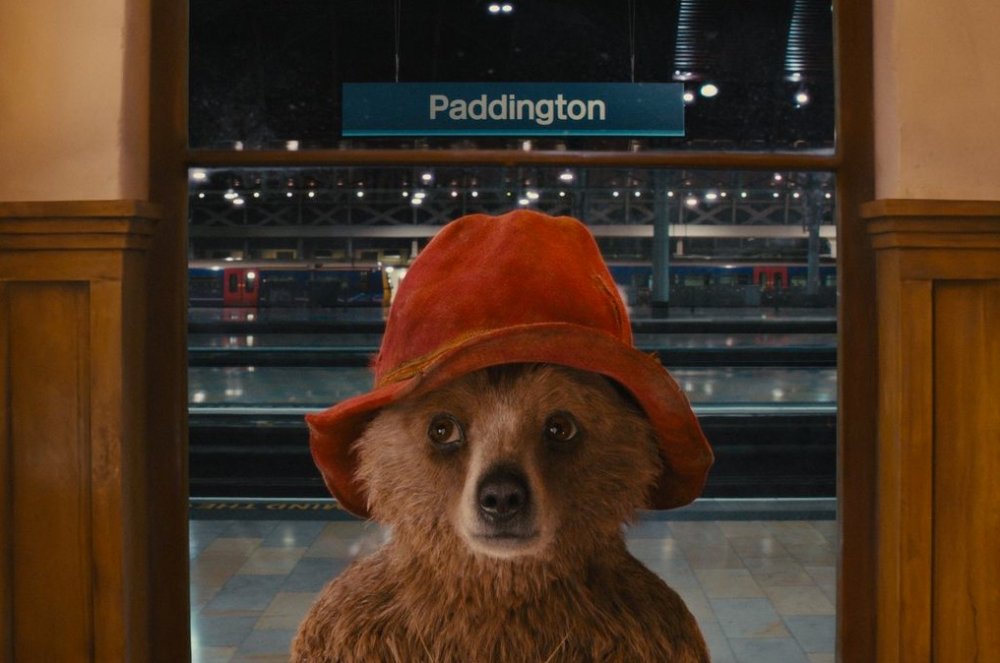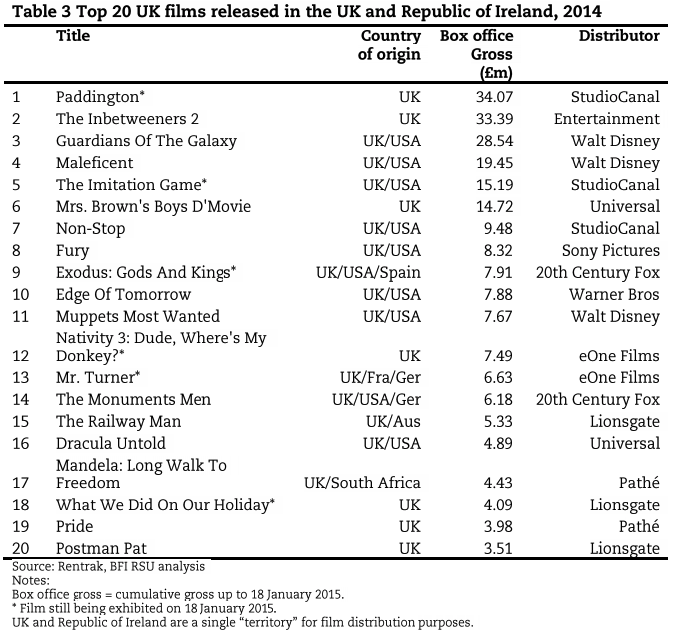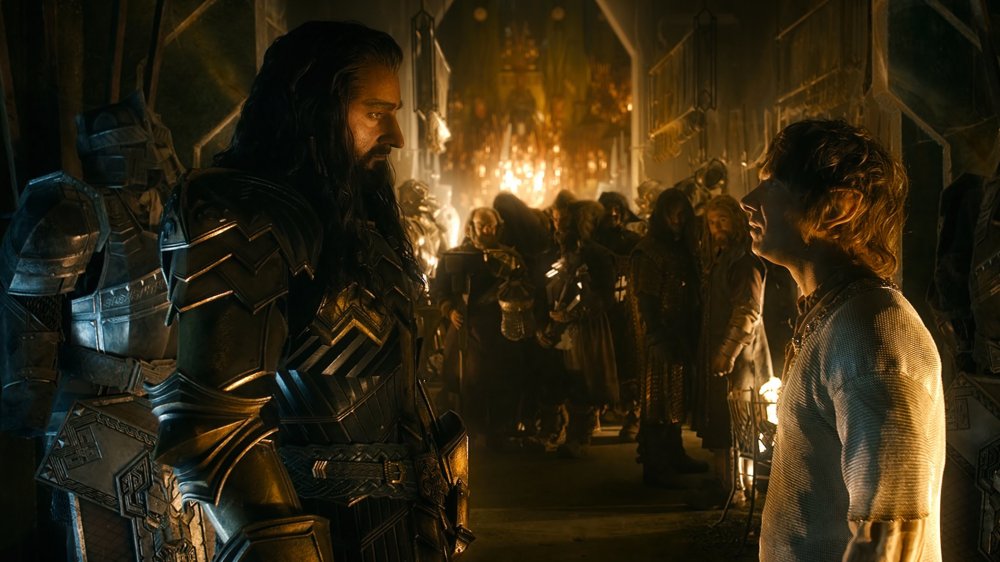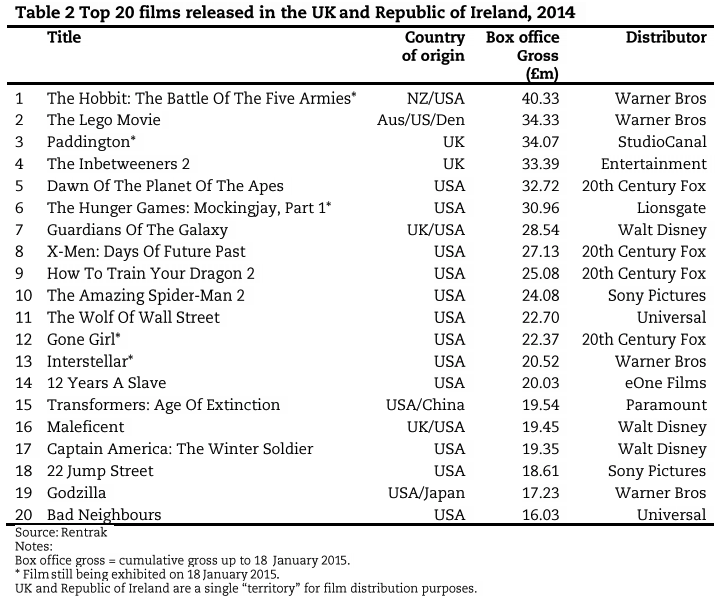
Paddington (2014)
Independent figures published today by the BFI show the UK’s screen industries are thriving and making an increasingly significant contribution to the UK economy and audiences are enjoying British film more than ever. 2014 saw a massive surge in film production in the UK, generating a total spend of £1.471 billion in 2014, a 35% increase on 2013 and the highest recorded figure ever.
The tax reliefs for film, high-end television, animation and now video games are helping to drive production investment. During 2014, international inward investment films coming to the UK included Star Wars: Episode VII – The Force Awakens, Mission: Impossible 5, Alice in Wonderland: Through the Looking Glass and Pan; domestic UK films which went into production across the UK included Testament of Youth, 45 Years, Dad’s Army, Kill Your Friends and Shaun the Sheep; and major high-end TV productions included Wolf Hall, Downton Abbey and 24: Live Another Day.
Independent home-grown productions are capturing UK audiences and achieved their highest market share ever at the UK box office (almost 16%). At the UK box office Paddington was the highest grossing independent UK film of 2014 taking £34.07 million, and is continuing to pull in audiences this year. Other successful independent UK films were diverse and broad-ranging – many of which were Lottery funded through the BFI – including Mr Turner, Pride, Calvary and Belle, as well as Nativity 3: Dude, Where’s My Donkey?, and The Inbetweeners 2. Overall, independent UK films and British-qualifying inward investment productions had a market share of almost 26% of the UK box office up from 22% in 2013.

Top 20 UK films released in the UK and Republic of Ireland, 2014
Culture Secretary Sajid Javid said:
The UK film industry is a powerhouse for growth and I’m delighted that 2014 saw an all-time high spend on film production. Supporting the creative industries, including our vibrant film sector, is a key part of the Government’s long term economic plan and we have worked hard to create the right environment here for the UK film industry to flourish. The huge amount of inward investment we are seeing is a sure fire sign that the UK is the best place in the world to make films.
Amanda Nevill, CEO of the BFI, said:
Today’s report illuminates a dynamic and vibrant story of success for the screen industries in the UK. It’s a sector alive with opportunity and energy, where creativity and fiscal policy is working hand in hand to make the UK the most exciting place on the planet to do business.
Adrian Wootton, CEO of the British Film Commission, says:
The production statistics demonstrate just how popular the UK is to international film and television productions. Our tax reliefs, world-class crew, state-of-the-art facilities and award-winning talent are a formidable package. The British Film Commission, working closely with our partners, the wider industry and Government, have been able to successfully secure some of the world’s biggest productions for the UK.
Production
Film
Film production in the UK saw a massive surge in 2014, generating a total spend of £1.471 billion, a 35% increase on last year’s £1.093 billion and the highest figure since these statistics were first recorded 20 years ago.
The confidence that international filmmakers have in the creativity and expertise of the UK’s crews and world-class production facilities, combined with the UK film tax relief as well as the service provided by the British Film Commission, have played their part in generating a spend in the UK of £1.233 billion. Major international films increasingly choose to make the UK their production base, bringing investment, creating jobs, and contributing to the UK economy.
These 36 major films include Star Wars: Episode VII – The Force Awakens for LucasFilm, Mission: Impossible 5 for Paramount, Avengers: Age of Ultron for Marvel Studios, Grimsby for Sony, In the Heart of the Sea and Tarzan for Warner Bros, as well as features based on classic British stories which have inspired audiences worldwide including Alice in Wonderland: Through the Looking Glass for Disney, Pan for Warner Bros, and the new James Bond Spectre.
The momentum for big-budget inward investment productions coming to the UK continues in 2015 with the new Untitled Standalone Star Wars project for LucasFilm and Fantastic Beasts and Where to Find Them for Warner Bros, the new Game of Thrones Season 5 for HBO going into production this year.
Spend on making domestic UK film production also increased with £188 million on films budgeted at £0.5 million and above, 36% up on 2013. This spend was spread across a total of 74 films which went into production in 2014, compared to 65 in 2013.
UK domestic films made in 2014 reflect a range of filmmaking and storytelling including Suffragette (director Sarah Gavron); High Rise (director Ben Wheatley); Shaun The Sheep (directors Mark Burton, Richard Starzack); Testament of Youth (director James Kent); London Road (director Rufus Norris); Kill Your Friends (director Owen Harris); Hockney: A Life in Pictures (director Randall Wright); Kajaki (director Paul Katis); Miss You Already (director Catherine Hardwicke); Bolshoi Babylon (director Nick Read); and 45 Years (director Andrew Haigh) which is premiering in competition at the Berlin Film Festival this week.
Co-productions made in the UK last year totalled £37.4 million in production spend and include Sunset Song (director Terence Davies); Brooklyn (director John Crowley); Autobahn (director Eran Creevy); Queen of the Desert (director Werner Herzog); The Lobster (director Yorgos Lanthimos); as well films from talent making their feature film debuts, Departure (director Andrew Steggall) and Tiger House (director Thomas Daley). The number of co-productions was 32, down from 53 in 2013.
The data on films budgeted at less than £0.5 million is always revised upwards during the course of the next six months. At this point investment in these micro and low budget films was £12.4 million in 2014 compared to £17.7 million in the previous year. These films are vitally important as the talent incubator for the UK’s next generation of successful filmmakers.
High-end television
The BFI’s annual statistics reveal the first full year of the impact of the new tax reliefs for high-end television (HTV) and animation programmes, which became available in April 2013.
A total of 87 HETV programmes, which have high production values and are sold and broadcast around the world, including Downton Abbey, Wolf Hall, the forthcoming 24: Live Another Day, Poldark, Cilla, Foyle’s War and Granchester generated £615 million in production spend.
TV animation
The new TV animation tax relief came into effect relatively recently, however the statistics are an early indication of growth in the sector. 22 animation programmes went into production with a UK production spend of £36.8 million and, of these, 16 were domestic productions spending £32 million. Programmes include Sarah and Duck — Series 2; Mr Bean: The Animated Series; Toot the Tiny Tugboat; and One Night in Hell.
Video games
Video games are also tracked in the year-end analysis for the first time following the introduction of the video games tax relief in April 2014 and therefore the data is still very new. To date, the nine-month period shows a production spend of £2.3 million across 9 video games including Beyond Flesh and Blood, Enigma Express, MazeCraft, Shred It!, Soul Axiom and Wayward Tide, which sought UK certification for tax relief.
Box office
Film
2014 marked the fourth consecutive year that the overall UK box office crossed the £1 billion barrier, though total takings were down 2% on the previous year. Admissions continue to reflect the plateau trend which has typified the UK cinema business over the past decade, with 157.5 million tickets sold, a 5% dip on 2013.

The Hobbit The Battle of the Five Armies (2014)
However, for the first time ever, the market share of UK independent films reached almost 16%, up from 6% in 2013. This was led by BAFTA-nominated Paddington which took £34.7 million in 2014, followed by The Inbetweeners 2 which took £33.39 million. Together, these two films took a total of £67.5 million, over three times more than the £21.2 million grossed by the top two independent films in 2013 (Philomena and Rush). Across the top independent earners, seven films took £5 million or more in 2014, compared with five in 2013. Overall, independent UK films and inward investment British qualifying films had a market share of almost 26% of the UK box office, up from 21% in 2013.
The top 20 films in 2014 features a variety of big budget US studio productions, co-productions and UK films in the top four highest grossing films. The Hobbit: The Battle of the Five Armies was the highest grossing film of 2014 with takings of £40.3 million, followed by The Lego Movie grossing £34.3 million, then UK independent productions Paddington and The Inbetweeners 2.

Top 20 films released in the UK and Republic of Ireland, 2014
The end of 2014 saw a boom at the box office with December the busiest month of the year with 17.12 million admissions. Leading the charge was The Hobbit: The Battle of the Five Armies, Paddington, The Hunger Games: Mockingjay, Part 1, Interstellar and The Imitation Game.
A summer of sport saw admissions May and June down most significantly by 20%. January admissions were down by 11%, affected by an extraordinarily high admission figure for 2013 with the release of The Hobbit: An Unexpected Journey, Life of Pi and Les Misérables.
Download the official statistics reports
The UK box office in 2014 1.9 MB





